US war party seeks to derail peace process on Korean peninsula: Scholar
The US Congress and the Deep State are attempting to scuttle President Donald Trump’s efforts to establish peace on the Korean peninsula, says Dennis Etler, an American political analyst who has a decades-long interest in international affairs.
In an interview with Press TV on Saturday, Etler, a former professor of Anthropology at Cabrillo College in Aptos, California, said that new US National Security Adviser John Bolton is among the players who are opposing the peace process between South and North Korea.
On Friday, Bolton said that President Trump had not asked the Pentagon for options to reduce American forces deployed to South Korea.
John Bolton’s statement came a day after after The New York Times reported that the US president was seeking options to curb the number of American troops stationed in South Korea.
"The New York Times story is utter nonsense. The President has not asked the Pentagon to provide options for reducing American forces stationed in South Korea," Bolton said.
Professor Etler said, “The US is entering into unchartered waters as the proposed ‘peace talks’ between Trump and Kim Jong-un approach. The summit and the prospect of an official end to hostilities on the Korean peninsula after nearly 70 years of conflict are the culmination of the DPRK’s nuclear and missile programs. Without North Korea’s provocative actions there would have been no incentive for a change in the decades-long stalemate which gives the US a rationale for maintaining its military presence in East Asia.”
“Kim Jong-un, while leader of the DPRK, does not operate in a vacuum. He represents the will of the North Korean nation and its people. Thus it is the policy of the DPRK, not Kim Jong-un alone, that has kick-started the peace process. By creating a credible nuclear deterrent to US imperialism’s attempt to isolate and intimidate the North, Kim’s brinkmanship has matched Trump’s and forced the issue of US aggression on the Korean peninsula,” he added.
“The dramatic turnaround in relations between the North and South was initiated by the DPRK with its overtures to the South, participation in the Winter Olympic Games at Pyeongchang, invitation to Trump for face to face negotiations, meeting with Chinese President Xi Jinping in Beijing and the summit between Marshall Kim and President Moon. These initiatives placed the US in an untenable position,” he stated.
“Trump’s previous positions, calling for a drawdown in the US troop presence in South Korea and denuclearization of the Korean peninsula made it next to impossible for the US not to respond positively to Kim’s pledge to abandon its nuclear program in exchange for a peace treaty and guarantees of the DPRK’s sovereignty and non-interference in its internal affairs. Kim’s visit to Beijing reinforced the North’s negotiating position by providing China’s backing for the peace process,” the analyst said.
“The question of the status of US troops in the South following a peace treaty thus takes center stage. There are many forces in the US, both in Congress and the so-called ‘Deep State’ that want to scuttle the peace process, National Security Advisor Bolton among them. Their intransigence in refusing to even discuss troop withdrawals are meant to put a damper on the peace process by presenting the North with a non-negotiable demand that on first glance would make negotiating a peace treaty a non-starter,” he noted.
‘Kim preempted ploy of US Deep State’

“But Kim has already pre-empted that ploy by stating that the continued deployment of US forces in the South is not an impediment to signing a peace accord. This gives Trump, who desperately needs a ‘victory’ in order to bolster his presidential bonafides, the opportunity to successfully conclude a peace treaty with all concerned parties. The pressure would then be on for eventual US troop withdrawals,” the scholar said.
“Hardliners within the Trump Administration want to prevent that outcome at all costs, but Trump’s personal agenda may prevent them from doing so. The question is will Trump’s quixotic campaign to denuclearize the Korean peninsula succeed or will the bipartisan Washington war party regain the upper hand,” he observed.
“The ball is in Washington’s court, but the US team seems to be divided between its star player and the coaching staff. The opposing team in Pyongyang now has a deep bench with both South Korea and China waiting in the wings to support Kim’s position. The outcome will determine whether peace or continued conflict reigns in East Asia for the foreseeable future,” the commentator concluded.
North Korean leader Kim Jong-un last month agreed for a meeting with US President Donald Trump after the former CIA Director, now the US Secretary of State, Mike Pompeo, met with Kim secretively in North Korea.
During their first summit in more than a decade, the two leaders stated that they would seek an agreement to establish "permanent" and "solid" peace on the Korean peninsula.
The landmark declaration also includes pledges to pursue military arms reduction, cease "hostile acts," turn their fortified border into a "peace zone," and seek multilateral talks with other nations, such as the US.
During the April 27 meeting with Moon, Kim reportedly said he would give up his nuclear weapons if the US pledges not to invade his country.
Trump said that Americans should be "proud" of the progress being made towards establishing peace on the Korean peninsula.
He hailed the meeting between the two Korean leaders as an end to the Korean War, which ended in 1953 when the two countries signed the ceasefire – the Korean Armistice Agreement.
Activists announce 'Freedom and Sumud Flotilla' to challenge Gaza blockade
VIDEO | Rome residents demand end to ties with Israeli firms
VIDEO | Pakistan Senate condemns ‘hexagon of alliances’ as Indian PM visits Israel
VIDEO | Founder of French pro-Palestine NGO appears before court
VIDEO | Modi’s Israel visit sparks opposition, domestic backlash
VIDEO | Continuous war on media in occupied West Bank
Kabul rocked by explosions as Pakistan launches airstrikes
Iran Armed Forces warn US of severe consequences for any aggression








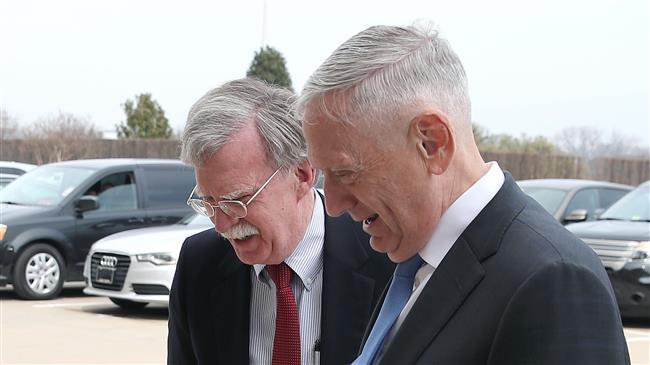
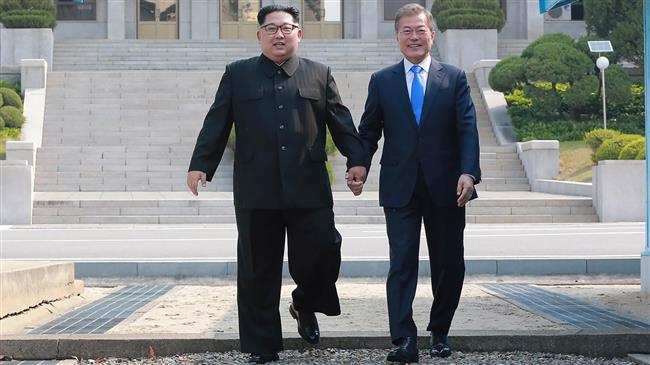
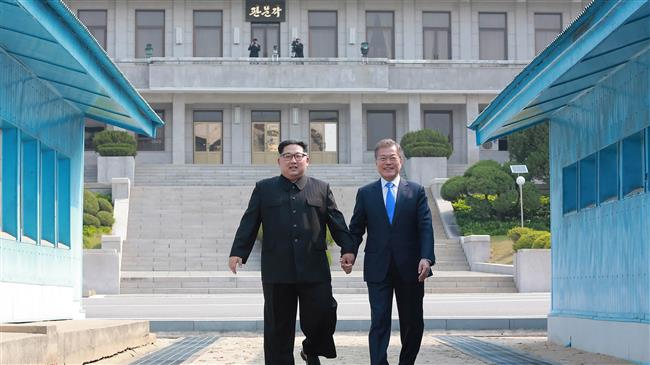
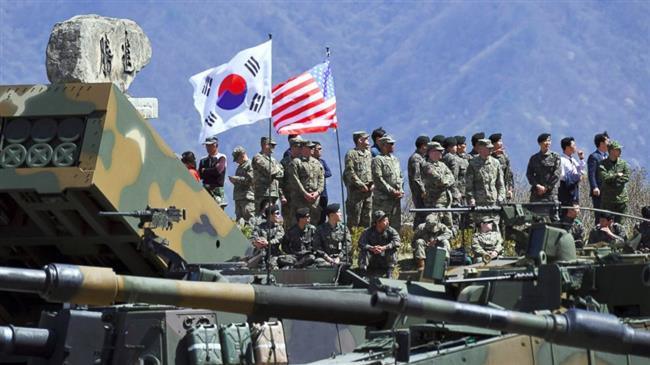
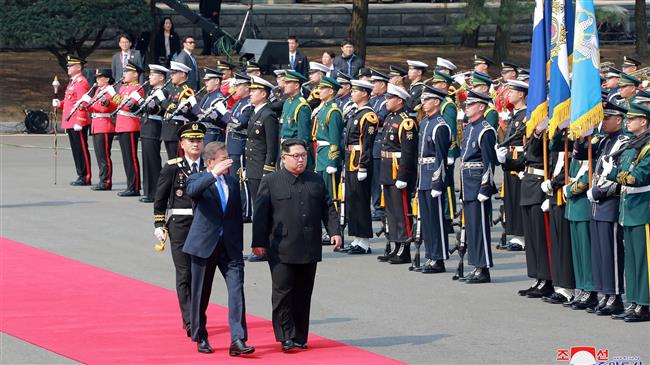
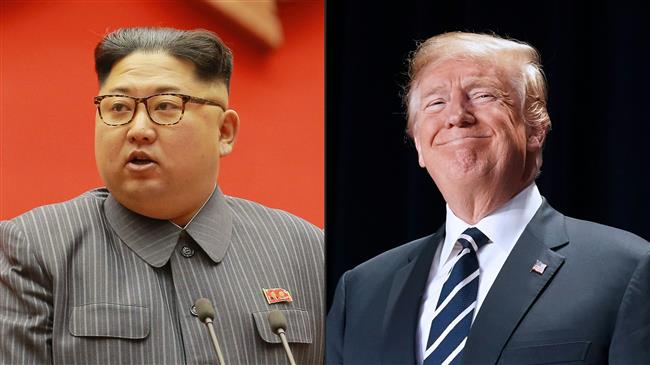
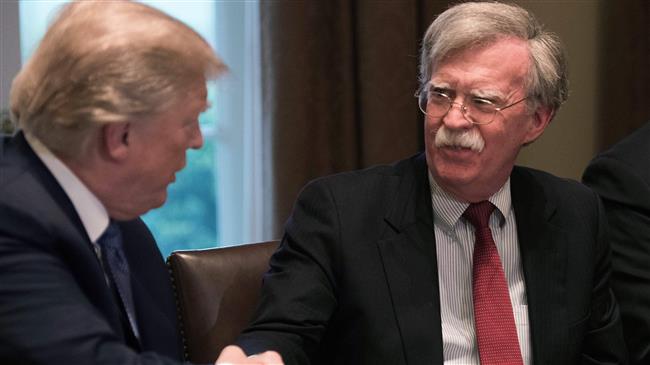

 This makes it easy to access the Press TV website
This makes it easy to access the Press TV website